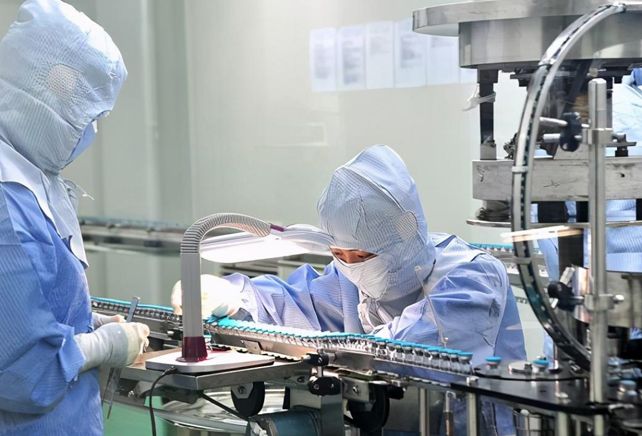Intermediate is a very important type of fine chemical products, which is essentially a type of "semi-finished product", mainly used in the synthesis of pharmaceuticals, pesticides, coatings, dyes, and spices.

01. The so-called pharmaceutical intermediates are actually some chemical raw materials or products used in the process of drug synthesis. This type of chemical product does not require a drug production license and can be produced in ordinary chemical plants. When it reaches certain levels, it can be used for drug synthesis.
At present, the most promising varieties of pharmaceutical intermediates are mainly as follows:
Nucleoside intermediates. The anti AIDS drug synthesized from this kind of intermediate is mainly zidovudine, which is produced by Glaxo Wellcome and Bristol Myers Squibb.
Cardiovascular intermediates. Synthetic sartan drugs have become widely used in the treatment of hypertension due to their more thorough antihypertensive effect, fewer side effects, long efficacy (stable control of 24-hour blood pressure), and the ability to be used in combination with other sartan drugs. According to data statistics, in 2015, the global demand for major raw materials of sartan drugs (losartan potassium, olmesartan ester, valsartan, irbesartan, telmisartan, candesartan ester) reached 3300 tons. The total sales revenue is 21.063 billion US dollars.
Fluorine containing intermediates. The fluorinated drugs synthesized from this type of intermediate have rapidly developed in recent years due to their excellent therapeutic effects. In 1970, only 2% of fluorinated drugs were on the market, but by 2013, it had increased to 25%. Representative products such as fluoroquinolone antibiotics, antidepressants fluoxetine, and antifungal drugs fluconazole account for a relatively high proportion of clinical use, with fluoroquinolone antibiotics accounting for about 15% of the global market share of antibiotics. In addition, trifluoroethanol is an important intermediate in the synthesis of anesthetics, while trifluoromethylaniline is an important intermediate in the synthesis of antimalarial drugs, anti-inflammatory and analgesic drugs, anti prostate drugs, and antidepressants, with a very broad market prospect.
Heterocyclic intermediates. With pyridine and piperazine as representatives, they are mainly used to synthesize anti ulcer drugs, bulk stomach drugs, anti-inflammatory and anti infection drugs, highly effective antihypertensive drugs and new anti breast cancer drug letrozole.
02. Pharmaceutical intermediates are an important link in the pharmaceutical industry chain.
Upstream are basic chemical raw materials, with the majority being petrochemical products such as acetylene, ethylene, propylene, butene and butadiene, toluene and xylene.
Medical intermediates are subdivided into primary intermediates and advanced intermediates. Primary intermediate suppliers can only provide simple intermediate production and are at the forefront of the industry chain, with the greatest competitive and price pressures. Therefore, the price fluctuations of basic chemical raw materials have a significant impact on them.
Advanced intermediate suppliers not only have strong bargaining power over primary suppliers, but more importantly, because they undertake the production of advanced intermediates with higher technological content and maintain closer connections with multinational corporations, the impact of raw material price fluctuations on them is relatively small.
The midstream belongs to the pharmaceutical and fine chemical industry. Manufacturers of pharmaceutical intermediates synthesize crude intermediates or active pharmaceutical ingredients and sell the products in the form of chemical products to pharmaceutical companies, which refine them before selling them as drugs.
Medical intermediates include two types of products: general and customized. According to the different stages of outsourcing services, the customized business models for intermediates can generally be divided into CRO (Contract Research and Development Outsourcing) and CMO (Contract Production Outsourcing).
In the past, pharmaceutical intermediates mainly adopted the CMO business outsourcing model. In the CMO model, pharmaceutical companies outsource the production process to their partners. Therefore, the business chain generally starts with specialized pharmaceutical raw materials. Industry companies need to purchase basic chemical raw materials and classify them into specialized pharmaceutical raw materials, and then gradually form raw material starting materials, cGMP intermediates, raw materials, and formulations through further processing.
However, with the demand of pharmaceutical companies for cost control and efficiency improvement, simple production outsourcing services can no longer meet the needs of enterprises. The CDMO model (Production Research and Development Outsourcing) has emerged, which requi
